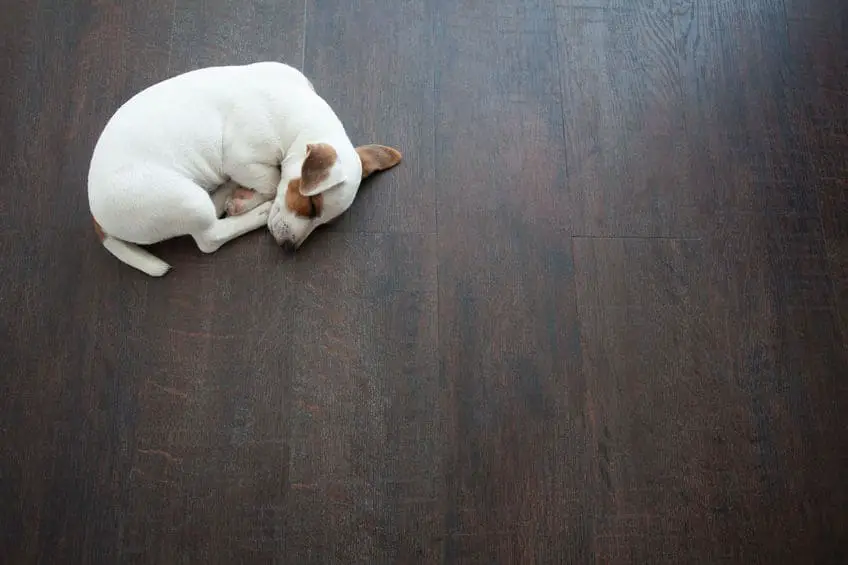This post contains affiliate links.
A lot of homeowners today have pets in their homes and if you’re one of those people who maybe had dogs or cats, you would know how floors can get damaged, or stained overtime as your pets move about everyday. It is important then to choose the right floor, one that is durable and can easily be maintained, and also safe for your pet’s use.
When choosing the best floor material for your pets, you should also consider your needs as well so that both you and your pets benefit from it. Below are the things you should think about when choosing the right floors for pets.
Durability – being able to resist the usual wear and tear, and depending on the amount of traffic you would have in your homes, it should last for years.
Scratch Resistance – this goes hand in hand with durability. Since most pets have long sharp claws, the floor material should be hard or resilient enough to resist damages caused by claws.
Stain Resistance – pets can sometimes leave their urine or stool on your floor, which when left unattended can seep in and may cause staining. So floors with some stain resistance are good to have.
Maintenance and Cleanability – in most cases, floors should easily be maintained and cleaned. It should not take up a lot of your time. Urine clean-up or sweeping off of pet hair and fur should not be a burden.
Pet Comfort and Safety – choose floors that has a good traction. Pets can easily slip and get injured if your floors are too smooth and slippery. Some floor materials also provides bit of comfort when pets lie down on it.
Aesthetics and Beauty – this is actually more for us people than for our pets. Just like any other material in our houses, the floor that we choose should look good, and compliment the other aspects of the design of our houses as well.
Now, knowing what to consider, below is the list of the 14 best floor options for your pets.
I’ve provided a table below with all the floor materials that will be discussed further below. I’ve assigned a score from 1 to 5 for each of the important characteristics a good floor for pets should have. 1 being the lowest and 5 the highest. The scores that are listed below are based on my professional opinion. Use it as a guide when you look for a good flooring material for your pets.
| Material | Durability | Scratch Resistance | Stain Resistance | Maintenance | Pet Comfort | Beauty | Total Rating |
|---|---|---|---|---|---|---|---|
| 1. Cork Flooring | 5 | 4 | 4 | 4 | 4 | 3 | 24 |
| 2. Engineered Bamboo Flooring | 5 | 4 | 4 | 4 | 3 | 5 | 25 |
| 3. Luxury Vinyl Flooring | 4 | 5 | 5 | 5 | 3 | 3 | 25 |
| 4. Vinyl Sheet Flooing | 4 | 5 | 5 | 5 | 3 | 2 | 24 |
| 5. Ceramic Tiles | 3 | 5 | 5 | 5 | 2 | 3 | 23 |
| 6. Porcelain Tiles | 4 | 5 | 5 | 5 | 2 | 4 | 24 |
| 7. Natural Stones | 5 | 5 | 4 | 5 | 2 | 5 | 26 |
| 8. Solid Hardwood | 5 | 2 | 3 | 3 | 3 | 5 | 21 |
| 9. Engineered Hardwood | 5 | 2 | 3 | 3 | 3 | 5 | 21 |
| 10. Laminate Flooring | 3 | 3 | 3 | 4 | 3 | 4 | 20 |
| 11. Poured and Sealed Concrete | 5 | 5 | 5 | 5 | 2 | 3 | 25 |
| 12. Carpet Flooring | 2 | 5 | 1 | 1 | 5 | 5 | 19 |
| 13. Epoxy Flooring Coating | 5 | 5 | 5 | 5 | 2 | 4 | 26 |
| 14. Artificial Turf | 3 | 5 | 5 | 3 | 5 | 3 | 24 |
1. Cork Flooring
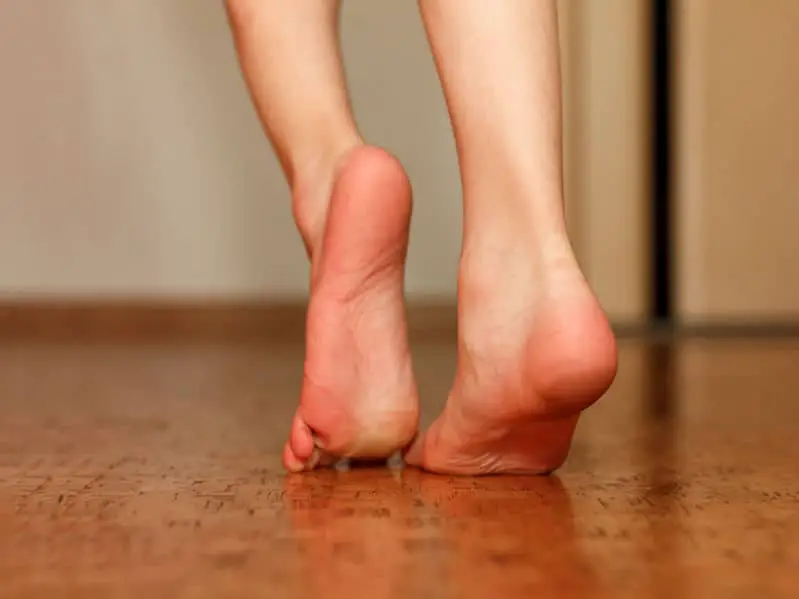
PROS
- Warm and has a soft cushioned surface comfortable for pets to walk and lie on. Good for cold climates.
- It is non-slip. It has good traction for your pets to walk on.
- Resilient and scratch resistant to a degree.
- Produces little noise.
- Water resistant, urine can easily be wiped off.
- Stain resistant to a degree. Any liquid should not be allowed to stand for too long.
- Environmental friendly
- Anti-microbial, prevents molds, and harmful allergens from growing.
- Will take 5-7 years before it needs to be refinished or resealed again.
CONS
- Will lose color over time
- Not good for rooms with heavy furniture.
- If not sealed properly, can get stained from urine.
Cork can sometimes resemble hardwood flooring. It is resilient and can resist scratches to a degree. Scratches will eventually show up overtime but using a lighter shade of cork would help sort of hide most of them.
Unlike most hardwood floors, cork flooring can be refinished every 5-7 years to bring back its shine and protective coat.
Like hardwood, it has a natural warmth, but not as rigid, providing your pets a comfortable surface to walk and lie down on. A good option for cold climates as it retains heat well, your pets can get comfortable lying down on it.
Since it has a little bounce to it, it absorbs sound, pets running, or walking on it produces very little noise.
It is naturally non-slip, and it will give your pets good traction to walk on. Just make sure you apply a good finish that would not make your cork flooring slippery.
It is naturally water resistant, but you still need it to have it sealed to prevent any liquid from sipping through the seams. Urine is an easy cleanup, just don’t let it sit for too long, otherwise it would cause it to stain.
If you’re into environmental friendly material, cork is a good choice. It is also antimicrobial and antibacterial, it is less likely to grow bacteria, molds, or any harmful allergens. It is a very sustainable material as it is made of all-natural components.
It will lose color over time, and faster when exposed to sunlight. It is also not ideal for rooms with heavy furniture since those can cause punctures and indentations to the cork flooring.
2. Engineered BAmboo Flooring
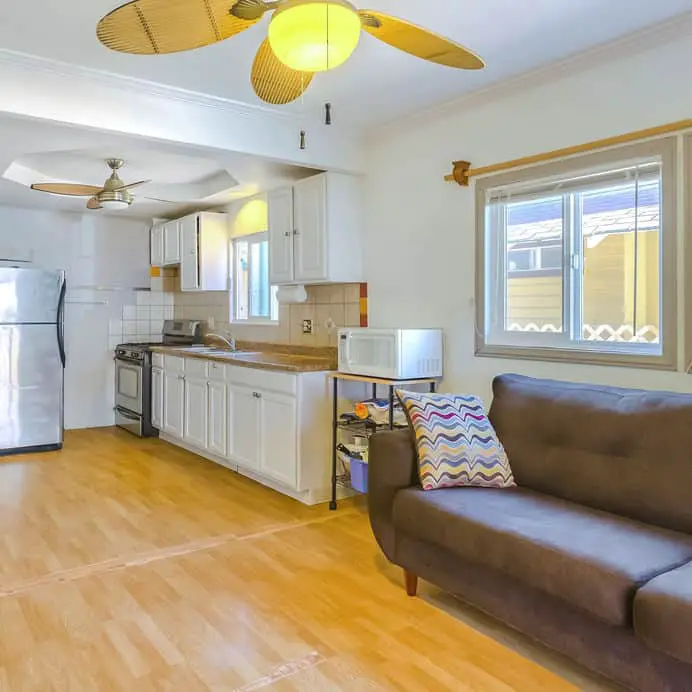
PROS
- Extremely durable. Harder than most hardwood floors.
- Scratch-resistant to a degree.
- Water-resistant and stain-resistant. Pet’s urine will not stain it.
- Anti-microbial.
- Environmentally friendly.
- Retains heat well, a good material to use in cold climates.
- Easy to maintain and clean.
CONS
- Heavy furniture and large pets may cause scratches.
- Using the wrong finish can make it slippery for pets to walk on.
Bamboo flooring, specifically a strand woven bamboo flooring, is an extremely durable floor type that can resist scratches and dents, even better than most hardwood floors. Although not all bamboo flooring is the same. Go for strand woven bamboo flooring types, as they are considered harder than most hardwood floors.
They still can get scratches, moving heavy furniture on it will cause those scratches but your pets would have to be big and heavy enough to make one. In any case, there are ways to remove these unsightly scratches from bamboo flooring.
It’s also more water-resistant than hardwood floors. Any liquid spilled, especially urine from pets, will not sip in even when left unattended for a long time compared to most hardwood floors. But that said since bamboo has still joints in between boards, letting liquid stand for a long time may allow it to get into unsealed cracks or joints which could penetrate and damage your floor’s substrate.
Bamboo floors will not get stained easily due to your pets’ urine. Cleanup is also a breeze. Just wipe it clean with a damp mop. Just avoid using any harsh chemicals on it.
Maintaining and cleaning bamboo floors are also easy. Just the regular sweeping and mopping is enough to let it last for a long time.
Similar to cork flooring, it’s environmentally friendly and very sustainable. It’s also naturally anti-microbial which prevents molds, bacteria, or any harmful allergens from growing.
Just like hardwood, it retains heat well. Good during winter as it gives enough heat for when your pets just want to hang and lie down.
Make sure though that you choose a good finish to use on your bamboo flooring. Just like hardwood flooring, the finish will give it traction and additional protection against scratches and dents. A wrong finish may make your bamboo floors too slippery for your pets to walk or run on.
3. Luxury Vinyl Flooring
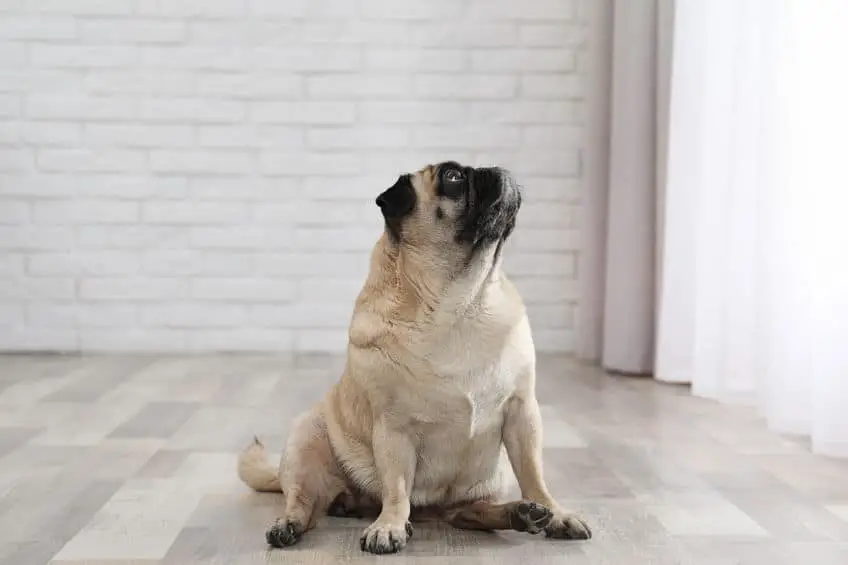
PROS
- Durable and resilient.
- High scratch-resistance
- Waterproof and stain proof. You can just wipe your pets’ urine dry with no worries.
- Easy to maintain and clean.
- Cheap alternative to real stone or real hardwood flooring.
- Gives a bit of traction for pets to walk on.
- Can accept radiant heating coils underneath.
- No resealing, or refinishing required.
CONS
- Not environmentally friendly.
- Can emit volatile organic compounds (VOC)
- You could still tell that it’s not real stone or real wood.
- Available styles and colors can easily change. Replacing a single tile or plank may be a challenge if the style that you need becomes obsolete.
- Not as long lasting as natural stone and hardwood. Top layer will fade overtime.
- Low-end vinyl flooring can shrink overtime, leaving unsightly gaps in between tiles or planks.
Vinyl flooring comes in many forms. It can be in a sheet, a plank, or a tile form. What is commonly used nowadays are the plank types or sometimes called as Luxury Vinyl Planks (LVP). Tile types or sometimes called Luxury Vinyl Tiles (LVT) are also used.
Luxury vinyl flooring are made of PVC and are very durable and resilient. Since it’s made of polyvinyl chloride (PVC), it is waterproof and stain proof as well. It is highly scratch-resistant and will hold well against large dogs, even heavy furniture.
They can mimic the look of natural stone or hardwood, but you could still tell though that they are not the real thing. But it’s a lot cheaper and easier to install than natural stone or real hardwood. It’s a low cost and low maintenance alternative to real stone or hardwood.
Easy to maintain, and easy to clean. Just wipe your pets’ urine dry and your done. Unlike other floor materials, refinishing, or resealing to reapply it protective layers are not necessary.
You don’t need to add a finish on luxury vinyl flooring and it has enough traction and grip for your pets to walk on. It has a little bit of a bounce and is quiet and comfortable to walk on.
It does not retain heat well but it’s not cold as well. It does accept radiant heating coils underneath if you wanted it warm.
It’s not as long-lasting as real stone or real wood floors. The outer layer will fade overtime depending on foot traffic. And low-end types of vinyl flooring tends to shrink overtime, showing gaps in between the planks or tiles.
Available styles and colors can change for some brands, so in case you need to replace a single tile or plank of your floor, you might not find the exact style or color you’re currently using.
Since it’s made entirely of PVC , it’s not environmentally friendly and may emit volatile organic compounds (VOC).
4. Vinyl Sheet Flooring
PROS
- The same pros as luxury vinyl tiles.
- It comes in rolls and has fewer seams when installed.
CONS
- The same cons as luxury vinyl tiles.
- Can easily become outdated.
- A lot of people doesn’t like their aesthetics.
Vinyl sheets have almost the same characteristics as luxury vinyl flooring. They are durable and resilient and can mimic real stone or real hardwood flooring.
The only difference is that they come in rolls, which means it has a few seams when installed.
It does however can get out of style easily and not a lot of people like the look of vinyl sheets.
5. Ceramic Tiles
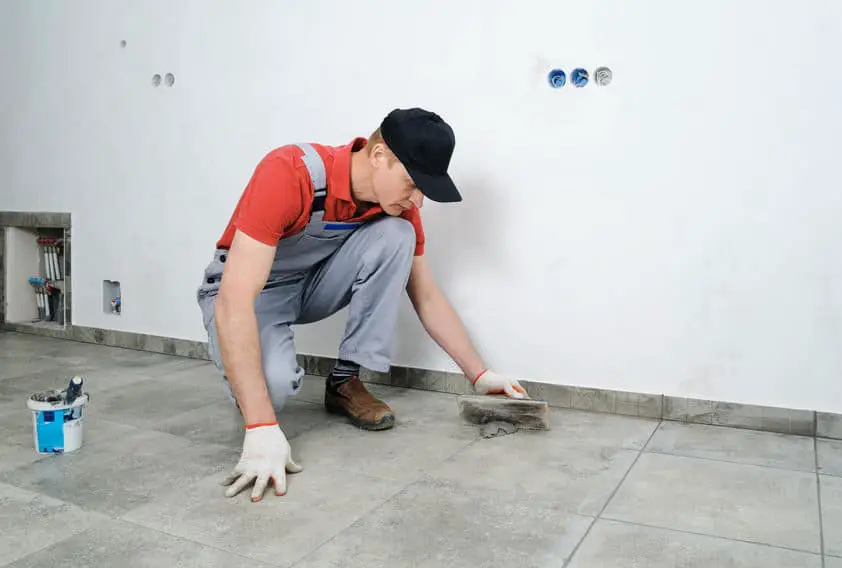
PROS
- Cheap flooring material.
- High water-resistance.
- Will not stain.
- High scratch-resistance.
- Easy to maintain.
- No resealing, or refinishing required.
CONS
- Hard and cold to the touch, it may not be the most comfortable material for your pets to lie down on.
- Can be slippery, and hard to walk on, though non-skid versions are available.
- Styles can easily become obsolete. Replacing a single tile would be a problem if you’re looking for an obsolete model.
- Not environmentally friendly.
Ceramic tiles are the cheaper kind of tiles in the market. Although both are made out of a clay mixture, the difference between it and the more expensive porcelain tiles is the type of clay used to make them, how they were baked, and how hard and dense they are. In other words, ceramic tiles are the low-end version while porcelain tiles are the high-end version of tile.
Ceramic tiles are extremely water resistant and stain resistant, which is why they are often used in toilets and other wet areas. It is a good flooring for pets that are still on potty training since the clean up is just an easy mop.
It has different colors and styles you could choose from. Some mimic the look of stone and wood although because of the seams, it’s quite easy to detect that they are not the real thing.
It doesn’t have to be refinished or resealed, like other flooring materials, to reapply its protective layers.
Big dogs can have a wild run on it without it breaking but it can easily break apart if a heavy object falls on it.
It’s hard and cold to the touch and is not quite comfortable for pets to walk on. These are good though for hot and humid climates, as your pets can lie down on it to cool down.
You have also an option to install radiant heat for houses with cold climates.
Most ceramic tiles are also smooth and slick, with a little traction, and can be slippery for your pets to walk on. There are non-skid tiles that are available though if you want a non-slippery tile but the styles are very limited.
The grouting in between the tiles can be a problem, if not maintained well and is constantly exposed to humidity, can grow molds and fungus. Regular cleaning of your tiles can easily avoid this problem.
Ceramic tiles are not environmentally friendly. It’s hard to recycle tiles and just ends up in dump sites or landfills.
6. Porcelain Tiles
PROS
- High water-resistance.
- Will not stain.
- High scratch-resistance.
- Easy to maintain.
- More durable and denser than ceramic tiles.
- Have a lot of styles and options with good traction.
- No resealing, or refinishing required.
CONS
- Hard and cold to the touch, it may not be the most comfortable material for your pets to lie down on.
- Styles can easily become obsolete. Replacing a single tile would be a problem if you’re looking for an obsolete model.
- Not environmentally friendly.
As mentioned above, porcelain tiles are the high-end version of tiles and are more durable and denser than ceramic tiles. If you’re choosing between ceramic tiles and porcelain tiles, go with porcelain tiles. It is more expensive than ceramic tiles though.
It’s more durable and have better resistance to high-impact forces than ceramic tiles. Although it can still break apart if a very heavy object is dropped on it.
Similar with ceramic tiles, it is extremely water proof and stain proof. It’s also very scratch resistant.
Since it’s denser than ceramic tiles, the grouting can be made thinner, as porcelain tiles doesn’t expand as much as ceramic tiles does.
Bigger sizes and better styles and colors are also available with porcelain tiles as compared to ceramic tiles.
Still hard and cold to the touch, porcelain tiles may not be comfortable for pets to walk and lie down on. Providing pet beds or area rugs on an area of your room for your pets can be a solution for this.
There are a variety of porcelain tiles that have good traction. Even when wet, you or your pets will not easily slip walking on it.
Similar with ceramic tiles, some styles can become obsolete, so replacing a single broken tile will be a problem if the style is no longer made.
7. Natural Stones
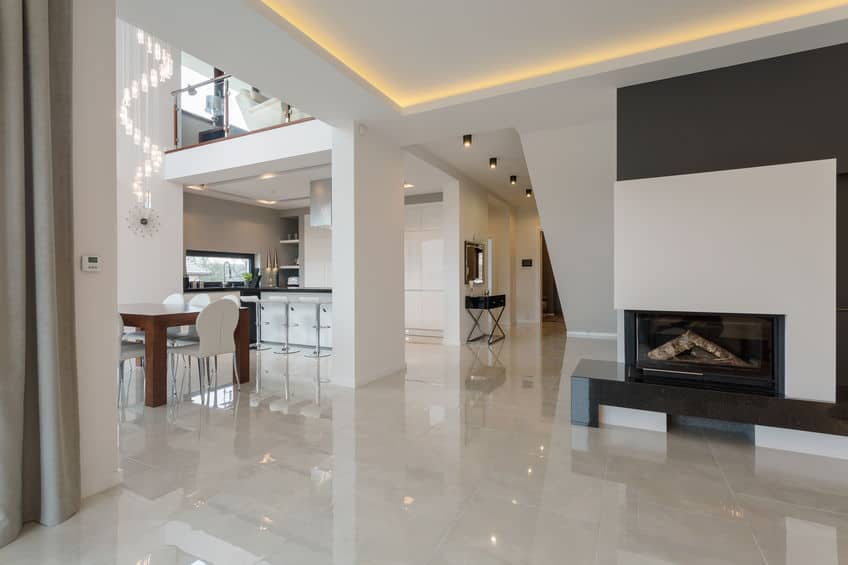
PROS
- Very durable and hard. It will not break easily and it will last more than your house’s lifetime.
- High water-resistance. It will not be damaged even if submerged in water.
- Will not stain with a good sealer applied.
- High scratch-resistance.
- Easy to maintain.
- All natural and can be recycled.
- Since it’s naturally harvested from the earth, styles won’t go obsolete and you can easily find the same tile or slab you plan to replace.
CONS
- Hard and cold to the touch, it may not be the most comfortable material for your pets to lie down on.
- Natural stones are porous and will absorb and retain stain if not sealed properly.
- Stains cannot be removed if it has already sipped through deep inside the stone.
- Needs to be resealed every 3-5 years to bring back its protective coating against stains.
Natural stones can be in big slabs as big as 2 meters or 3 meters long, or in smaller tile sizes such as 60 cm x 60 cm.
Natural stones are very durable and might be one of the hardest floor material you could use. It is also highly resistant to scratches even to large dogs with large sharp nails.
A lot of natural stones are available to choose from. Two most common of which are marble and granite. Since stones are natural products that are harvested from the earth, they don’t become obsolete. You will be able to find or replace the same exact color or style of stone you need even after several years.
It is however expensive although the long-term benefits outweighs this. It is very durable and will actually last more than the house’s lifetime. It can also be recycled and reused for other purpose as well.
Naturally stones are porous and so they are usually applied with a type of sealer. Natural stones will not get damaged with water absorbed, even if it gets submerged. Stains however will happen and can make your natural stone flooring look dirty.
Stains that have sipped deep inside the stone is impossible to fix, and replacing them is the only option. So it’s very important that you apply a good sealer to prevent liquid from sipping in. That of course include your pet’s urine.
Although natural stones can be made smooth, the right finish or sealant can give good traction for walking. Natural stones typically need to be resealed every 3-5 years to protect it from stains.
It is hard and cold to the touch though so it’s not the coziest place to lie on for your pets. This can be solved with a pet bed.
8. Engineered Hardwood
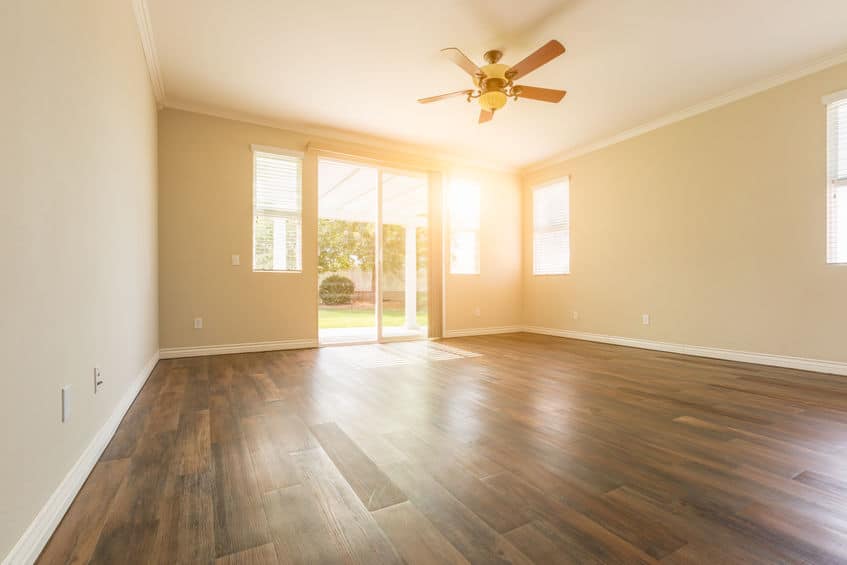
PROS
- Easy to clean.
- Depending on the finish that is used, it can have a good traction to walk on by your pets.
- Retains heat well and it’s nice for your pets to lie down on during the winter season.
- More dimensionally stable than solid hardwood and will not warp or buckle easily even when exposed to high moisture.
CONS
- Can easily be scratched but can be mitigated by applying a hard tough finish.
- Should be wiped dry as soon as any liquid spills on it, otherwise the liquid can sip through and damage the floor.
- Can easily stain from your pet’s urine if not attended immediately.
- You can only sanded and refinish it only a few times.
Engineered hardwood is usually sold as an alternative to solid hardwood both look exactly the same when installed but engineered hardwood has better resistance to moisture and humidity.
If you’re looking for the look of hardwood but with better stability then go for engineered hardwood.
It’s low scratch resistance on it’s own but a good tough finish will add protection. Scratches will do show up overtime, even with a tough finish, as your pets run around. A harder wood variety is recommended when getting an engineered hardwood for pets such as teak, mesquite, hard maple, brazilian cherry, or white oak so that it has a lower chance of getting dented.
Engineered woods can be sanded and refinished just a few times to remove the scratches. Planks or boards with thicker veneer is recommended so that you can sand and refinish the wood a few more times than usual.
Since it’s wood, it can retain heat well and can be quite comfortable to lie on by your pets. Depending on the finish that is applied, it can give good traction to walk on by your pets.
You can also go for distressed or reclaimed wood look so that scratches will not easily be seen. Resanding may not be necessary for this look.
It has a limited water resistance, depending on the finish that is applied, so wiping the floor dry as soon as any type of liquid spills on the surface is necessary. This includes your pet’s urine, if not attended immediately, can cause staining and damage to the floors.
There are options of waterproof engineered hardwoods as well that can resist moisture problems better.
9. Solid Hardwood
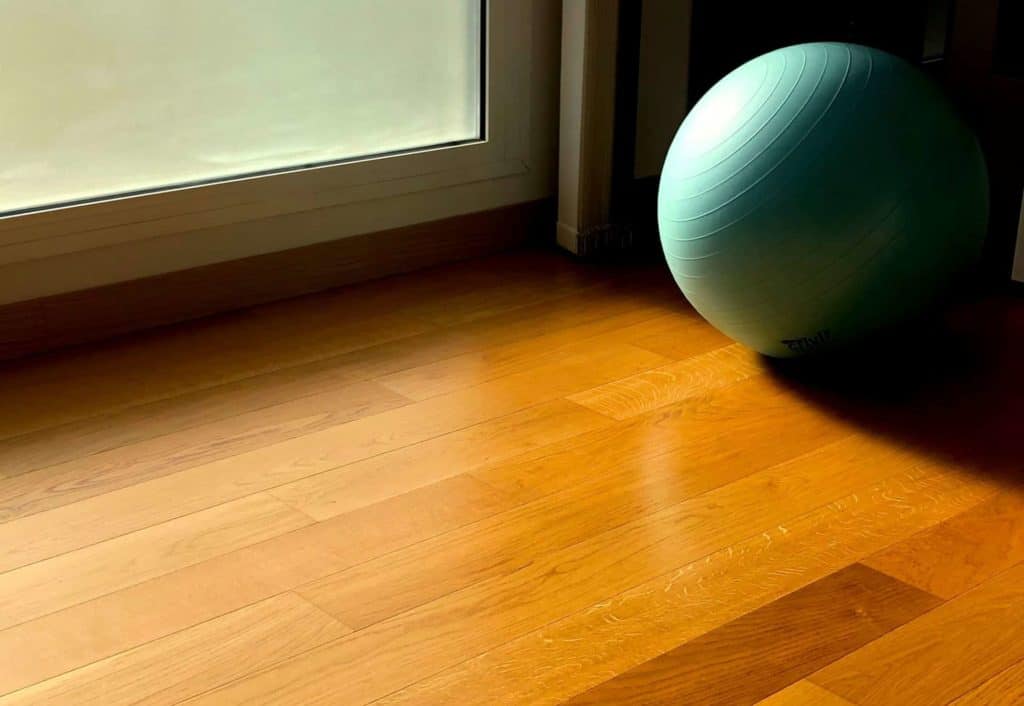
PROS
- Easy to clean.
- Can be sanded and refinished multiple times to remove scratches.
- Depending on the finish that is used, it can have a good traction to walk on by your pets.
- Retains heat well and it’s nice for your pets to lie down on during the winter season.
CONS
- Can easily be scratched but can be mitigated by applying a hard tough finish.
- Should be wiped dry as soon as any liquid spills on it, otherwise the liquid can sip through and damage the floor.
- Can easily stain from your pet’s urine if not attended immediately.
- Is not as dimensionally stable as engineered hardwood floors. It will warp or buckle when exposed to too much moisture.
Solid hardwoods are a classic with houses today. And a lot of homeowners still want to have them installed because of the look and the warmth it gives to each space of their houses.
It has very similar characteristics as engineered hardwood flooring. The difference is that solid hardwood floors are more susceptible to warping, and buckling due to moisture exposure compared to engineered hardwood floors.
The same with engineered hardwood floors, solid hardwood floors can be scratched easily by your pets’ claws, even with a good finish applied. If you’re getting solid hardwood, go for the more durable wood types such as cherry, hard maple, oak, hickory, mahogany, or elm. These woods are hard and will not dent so easily.
On the positive side, solid hardwood floors can be resanded and refinished as multiple times, and as often as you need. Resanding and refinishing will bring back the beauty of your solid hardwood floors.
The same with engineered hardwood floors, you can opt to use distressed wood that way you don’t have to think about the scratches. Those scratches will add to the character of the floor.
The biggest threat to solid hardwood floors is moisture, it can get damaged easily if liquid that is spilled on it is not addressed immediately. Urine can definitely destroy the beauty of your hardwood floors, as it can sip through the surface and leave a nasty stain. You can avoid staining by wiping it off immediately before the wood absorbs it.
10. Laminate Flooring
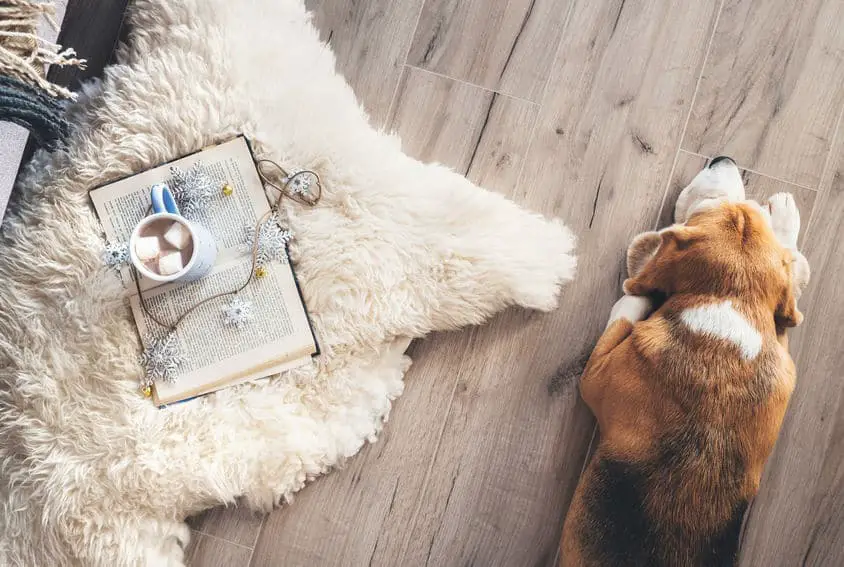
PROS
- Easy to clean.
- High resistance to scratches.
- It will not get stains.
- Dimensionally stable. It will not warp easily due to high moisture exposure.
- A cheaper alternative to hardwood floors.
- Doesn’t need to be sanded or refinished.
CONS
- Can be severely damaged if liquid gets through to its core.
- Can be slippery for your pets to walk on.
- It will wear and fade over time.
Laminate flooring is basically made out of a wood-chip composite core, and an impervious plastic surface with a high definition image underneath it. It mimics the look of wood or stone which is quite believable at times. It’s a cheaper alternative to real wood or real stone flooring.
Laminate flooring is dimensionally stable and will not warp easily due to high moisture exposure.
Because of the impervious wear layer above, it has a very good scratch resistance better than hardwood floors. It’s somewhat water-resistant since it will not allow any liquid to penetrate the surface. Urine will not cause it to stain.
If left unattended, any liquid left on the surface for a long time could still get in between the joints of your laminate flooring, which will cause it to swell and severely damage the floor.
Most laminate flooring is smooth in texture and can be slippery for your dogs to walk on. If you’re planning to get a laminate floor, look for an embossed or textured finish to give it a little traction, though still not as well other materials.
Since the outer layer is synthetic, it doesn’t need to be sanded or refinished but it will eventually wear and fade over time. It will last you around 15-25 years depending on the type of laminate floor you buy. When it does wear and fade, you would need to replace the whole floor.
11. Poured and Sealed Concrete
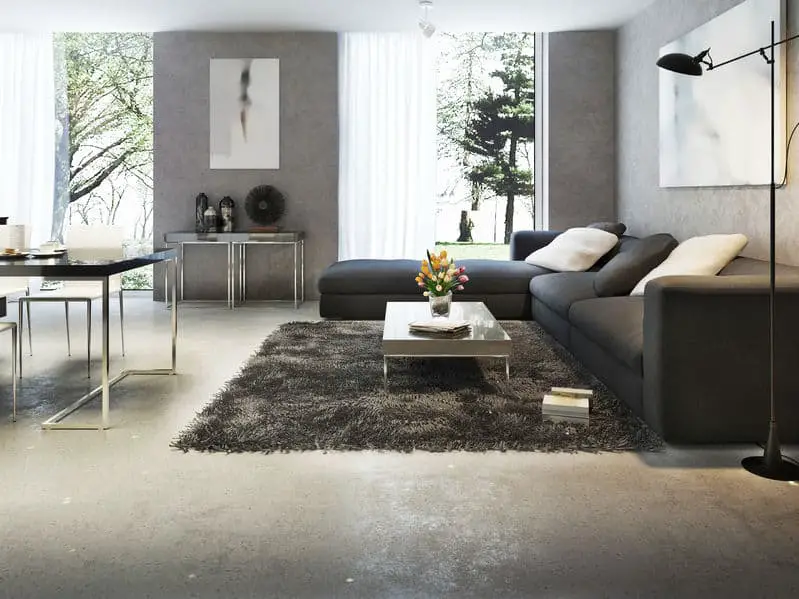
PROS
- Easy to clean.
- Scratch proof.
- Water proof.
- Will not stain as long as it is sealed.
- Very durable
CONS
- Hard and cold especially during the winter season.
Concrete floors can be a good durable floor to use. It will resist any types of scratches, even from heavy furniture. Your pets’ urine won’t affect concrete floors. Since they are fully sealed, any type of liquid wouldn’t stain or damage it.
It’s easy to clean, regular sweeping or vacuuming is okay. A wet mop will also work. It will last for a very long time.
Depending on your house’s design, a concrete floor will give an industrial looking vibe.
It has good traction for your pets to walk on. It is however hard and cold, especially during winter. Radiant floor heating is an option or adding an area rug to soften an area of your floor can make it more comfortable for your pets.
12. Carpet Flooring
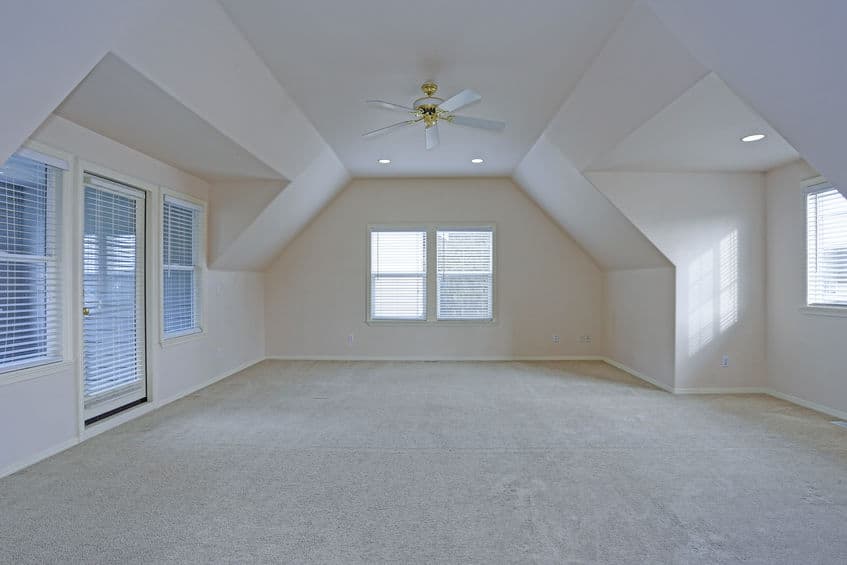
PROS
- Soft to walk on and gives a warm place for your pets to lie down on.
- Non-slip
CONS
- Easily stains
- Easily wears
- Hard to clean
- Attracts dirt, dust, and hair easily
Carpets are the best for your pets’ comfort. It is soft to walk on, gives a warm place for your pets to lie down, and non-slip. It is however worst for the human occupants as it can stain easily, it wears quickly, can be damaged by urine, attracts hair and dirt, and it can be difficult to clean.
If you really want to use carpet for any reason, there are several options you can do to minimize all its negative aspects.
You can go for non-white neutral colors that won’t show dirt as apparently. Then just vacuum it frequently to keep the fur from building up.
You also have the option of using carpet tiles, instead of the broadloom types which comes in rolls. Carpet tiles allows you to replace a single tile if it becomes damaged, or stained.
Or use a different floor material altogether and just use a carpet or area rug on a smaller area of your room. If it gets damaged or stained, you can easily roll it out of your room for cleaning.
13. Epoxy Floor Coating
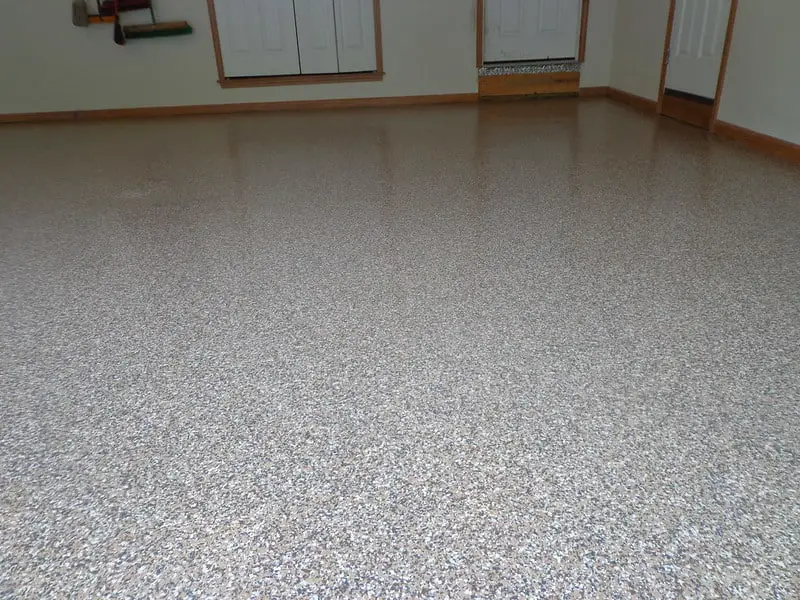
PROS
- Easy to clean.
- Scratch proof.
- Water proof.
- Will not stain as long as it is sealed.
- Very durable
- Can mimic natural stone look
CONS
- Hard and cold especially during the winter season.
Epoxy floor coating is usually applied over bare concrete floors. Its characteristics are very much the same with concrete floors but with the additional hardness and more color options to choose from. It is scratch-proof, waterproof, stain proof, and very easy to clean.
It’s seamless and will look as one piece. You can have it mimic natural marble or granite stone, or you can just go for one solid color. Depending on the aesthetics that your going for, you can have it customized by your applicator.
It also gives more traction, even when wet. Good for wet areas such as in basements.
As for your pets’ comfort, similar to cement flooring, it is hard and cold to the touch. You can add an area rug or a radiant floor heating to compensate for it.
14. Artificial Grass
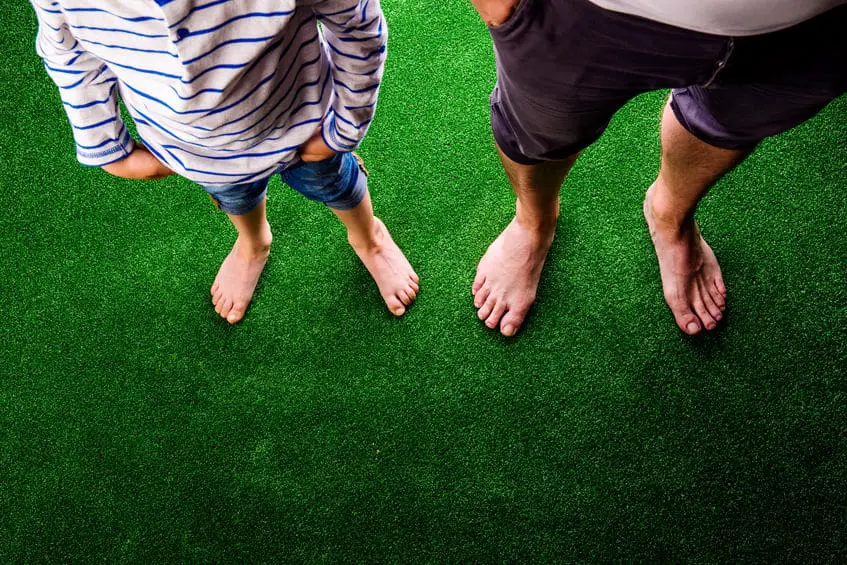
PROS
- Easy to clean.
- Scratch proof.
- Water proof.
- Durable enough to withstand rough play.
- Stain resistant.
- Soft and can be comfortable for your pets to roll and lie on
CONS
- You need to hire a professional to install it.
- Needs to be installed on a durable, waterproof substrate.
Artificial turf or synthetic grass may be an unconventional flooring material to use for a house but it can give an outdoors ambience on a play area, gym, or a common area of your house.
It’s very comfortable for your pets to play and roll on and can withstand rough play. Although not all artificial turfs are made the same, they can be durable enough even withstand deliberate chewing of your pets.
It is stain-resistant and can be cleaned easily. You would need to have a durable substrate to install the artificial turf though. Even though the artificial turf is durable, waterproof, and stain-proof, if the substrate it is sitting on is not, the whole flooring system may get damaged.
A good substrate for artificial turf to be installed on inside your house is concrete flooring. You would need to hire professionals also to install it to your floors.
All About Materials is a participant in the Amazon Services LLC Associates Program, an affiliate advertising program designed to provide a means for sites to earn advertising fees by advertising and linking to Amazon.com. We also participate in other affiliate programs which compensate us for referring traffic.

